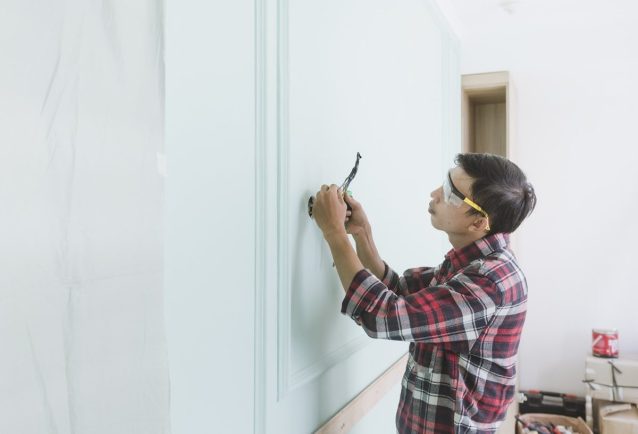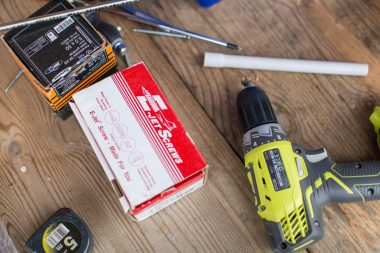Homeowners often need to deal with damage and issues that need to be repaired. It can often be difficult to determine whether a repair requires professional attention or can be done by yourself. While you want to save money on repairs, you also have to factor in safety and the necessity of issues being fixed properly. Here are some common home repairs that you can DIY, some you should call in professionals for, and a few ways you can know the difference.
Common Home Repairs You Can Do Yourself
With some home repairs, you probably don’t need to call in a professional. Here are some issues you can probably fix yourself with the right knowledge and tools.
Cracks in Surfaces: Cracks in walls, floors, or other surfaces can be unsightly as well as potentially damaging. Filling cracks doesn’t just improve the appearance of surfaces, but also helps prevent water penetration that can otherwise cause further damage. Many cracks can be repaired with concrete sealants. Concrete sealants come in various forms, such as caulking tubes or pre-mixed compounds. The process typically involves cleaning the area, applying the sealant evenly into the crack, and smoothing it out.
Leaky Taps: A dripping tap might seem like a minor annoyance, but it can really increase your water bills if left for a long time. Thankfully, repairing a leaky tap is often straightforward with basic plumbing skills. In many cases, the leak is a result of worn-out washers, O-rings, or seals, which can be easily replaced with simple tools.
Painting: A fresh coat of paint is one of the simplest and cheapest ways to spruce up a room, whether you’re covering up marks or replacing outdated decor. With the right tools, such as brushes, rollers, and painter’s tape, you can achieve professional-looking results yourself. Painting can also be a rewarding and enjoyable experience.
Replacing Light Fixtures: Whether you’re updating outdated fixtures or installing new ones, this DIY project is fairly simple. With only a few basic tools and careful attention, you can remove old fixtures and install new ones. One thing that’s vital to remember is to turn off the power at the circuit breaker before starting work — if you’re not sure how to do this, you can find online tutorials or seek advice from someone knowledgeable.
Repairs Requiring Professional Assistance

Although there are many repairs you can do yourself, some are risky or technical enough that they’re best left to the professionals. Here are a few examples.
Electrical Repairs: Electrical work can be complex and potentially dangerous. Although changing a light bulb or replacing a switch probably doesn’t require professionals, you should leave tasks like rewiring a room or installing new outlets to licensed electricians with the necessary training and experience to carry them out safely.
Roof Repairs: A damaged roof can leave your home’s interior vulnerable to the elements, and even threaten your home’s structural integrity. To fix or replace a damaged roof, you need the help of roofing professionals. Climbing on a roof yourself can be dangerous, especially without the proper safety equipment and training.
Plumbing Issues: Problems such as leaking pipes and blocked drains can quickly escalate from minor annoyances to serious issues if left too long. While you may be able to fix some problems with basic DIY skills, more complex issues like sewer line backups or water heater malfunctions need the attention of experts. Professional plumbers can diagnose and fix issues in ways that minimize water damage and mould growth.
How Can You Tell if You Can Fix it Yourself?
When faced with any home repair project, there are several factors to consider when deciding whether to choose a DIY approach or call in the professionals.
The Severity of the Issue: How much could this problem impact the safety, functioning, or aesthetics of your home? Minor cosmetic issues like painting or patching drywall are often DIY-able, while major structural issues or complex systems like electrical or plumbing may need professional intervention to prevent further damage.
Safety Concerns: Determine if there are any safety risks involved with repairing the damage yourself. Risks can include heights, the use of power tools, hazardous materials, electric shocks, and fires. Most tasks involving electricity, gas, or structural components are generally best left to trained experts to avoid injury or accidents.
Your Skill Level: Consider whether or not you have the skills necessary to carry out the repair effectively and safely. If you have experience, as well as access to the right tools and confidence in your abilities, you may be able to tackle a repair yourself. However, if in doubt, it’s best to err on the side of caution and hire a professional.
Cost: Calculate how much will it cost to fix damage yourself, compared to the costs of hiring a professional. Remember to take into account factors such as the cost of materials, tools, and permits. There may also be further costs of fixing errors you might make. Although hiring a professional might seem more expensive, it could save you time, money, and frustration by ensuring that the job is done right the first time.
Better Safe Than Sorry
Remember, you should only attempt a repair yourself if you have taken into account these factors and are 100% confident that you can do so safely and effectively. If in any doubt, leave it to the pros!












